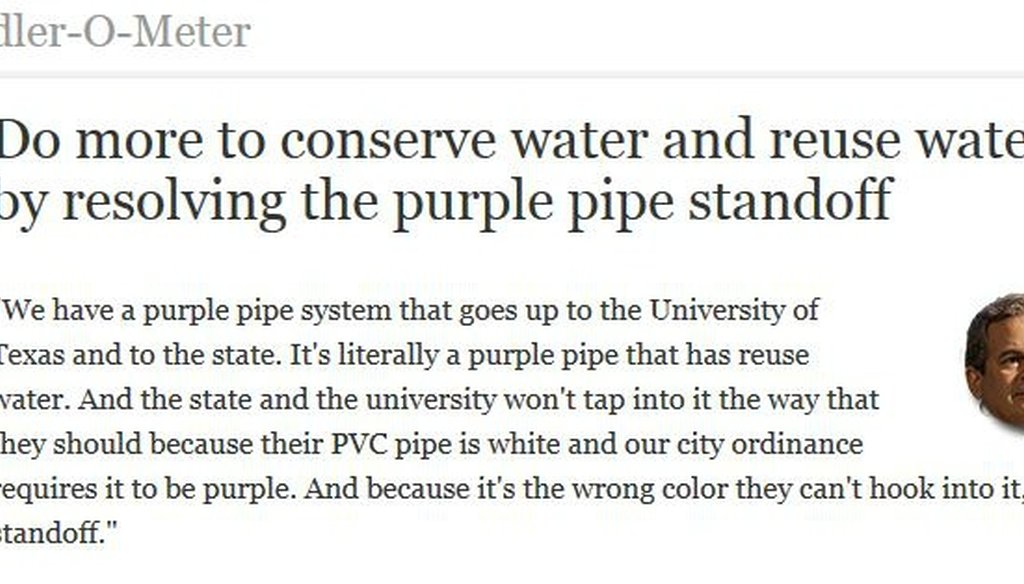Get PolitiFact in your inbox.

We're no longer considering this a promise by Austin Mayor Steve Adler. Issues were resolving before he took office.
Asked at a November 2014 election forum what he’d do to keep utility bills affordable, Austin mayoral candidate Steve Adler said, among other things, the city should do more to encourage water reuse.
Adler went on to say an obstacle had been that state government and the University of Texas weren’t able to hook up with the city’s 48-mile "purple pipe system." As of April 2015, that system was delivering non-potable treated wastewater to 72 customers, Austin Water Utility spokesman Jason Hill told us by email. Those customers mostly used the recycled water for irrigation and in cooling towers.
Stumping for votes, Adler said a city ordinance requires that pipes tapping into the system be purple, but all state and university pipes are white — so "they can’t hook into it, and we have this standoff" driven by the entities using conflicting colors, he said. And in January 2015, we included his vow to resolve such issues as a mayoral promise on the PolitiFact Texas Adler-O-Meter, grouping it among his promises Not Yet Rated.
Conflict gone?
Except, it appears, there wasn’t much of a piping conflict after all, which we've realized after a reader pointed out that on Nov. 20, 2014, the day before Adler made the purple pipe comments at the forum, the Austin City Council approved an ordinance overhauling its rules for supplementary water sources, such as recycled water and rainwater.
In April 2015, we checked in with Daryl Slusher, an assistant director at the Austin Water Utility, who said the new ordinance changed the city’s rules so those who want to use the treated wastewater don’t have to dig up their white PVC pipes and replace them with purple pipes.
Slusher said the city had required purple pipes for recycled water in the first place to ensure pipes carrying non-potable treated wastewater weren’t connected with typically white pipes carrying drinking water. But a study, undertaken by an outside consultant for the city hired in 2012, recommended scrapping that rule. A September 2014 presentation of the study said the mandate that customers employ purple pipes wasn’t common among other utilities selling reclaimed water. Also, the Austin requirement was a "major impediment" to converting existing irrigation customers to recycled water, the presentation said
The new ordinance took effect Dec. 1, 2014. As of then, the city started requiring "all easily accessible and above ground parts (sprinkler heads, valve box covers, meter)" connected to the recycled water system be purple rather than the pipes, Hill wrote in an email. Also, Hill said, signs newly had to be posted if a storage tank or outside faucet was connected to the recycled-water system.
Adler aide agrees issue settled
By email, mayoral aide Jim Wick agreed the purple pipe knot was untied before Adler was sworn in as mayor in January 2015. Still, he speculated, Adler’s raising the issue "may have had an effect on its ultimate resolution." Wick told us he couldn’t recall precisely who informed the mayor about the pipe snafus.
We also asked Slusher about the stalemates Adler earlier described between the city and UT and the city and the state.
Slusher said the Texas Capitol isn’t hooked up to the city’s purple pipe system for a simple reason: The city has yet to build the purple recycled-water system to the Capitol though construction starting in November 2015 is to be completed a year later. The city will pay the estimated $3.7 million cost, Hill wrote.
UT's perspective
As for UT, the main obstacle was figuring out how to avoid contamination when running pipes containing non-potable water through a crowded system of pipes containing potable water.
UT agreed to connect to the purple pipe system when the city was expanding the system in 2006 or so, Slusher said. But after that, he said, the city and the university locked horns over how to prevent the city lines containing non-potable water from connecting with the university’s "mishmash" of lines with potable water.
UT administrator Juan Ontiveros confirmed by phone that color was not a stumbling block; the main issue was figuring out how to comply with federal, state and city environmental regulations that prohibit the connection of potable and non-potable water lines, he said. Ontiveros said the 400-plus-acre campus is dense with buildings--"we’ve had to run pipes everywhere"--so it was tricky figuring out where to place the recycled water pipes.
In fact, the city issued a press release in August 2013 about the university tying a cooling tower into the city’s purple pipes. Ontiveros confirmed the UT pipe that connected the tower to the city’s system was purple.
Slusher told us making sure pipes carrying recycled water were purple was not a hangup for UT or the state. On the other hand, he said, the utility had trouble attracting other customers who previously would have to pay for replacing white pipes with purple ones before hooking in. Asked if the city’s seen an influx in customers since the 2014 ordinance took effect, Slusher said not enough time had elapsed to judge that.
One less Adler promise
All in all, it looks like Adler made a promise to resolve an issue that was being addressed before he took office. Notably, UT connected to the purple pipes in 2013, and construction is expected to start soon on running the city’s recycled water system to the Capitol.
Due to these developments (and with special thanks to an attentive reader), we’re shrinking the promises gauged by the Adler-O-Meter by one. Color us purple.
Our Sources
Emails, Jim Wick, director of community engagement, Austin Mayor Steve Adler, May 5, 2015
Presentation, "Auxiliary Water Codes Coordination Project Recommendations," Dan W. Pedersen, manager, Reclaimed Water Program, Austin Water Utility, Sept. 17, 2014
Telephone interviews, Juan Ontiveros, associate vice president for utilities, energy and facilities management, University of Texas, April 28 and May 8, 2015
Interview, Daryl Slusher, assistant director, Austin Water Utility, Austin, April 23, 2015
Email, Jason Hill, senior public information specialist, Austin Water Utility, April 28, 2015



























